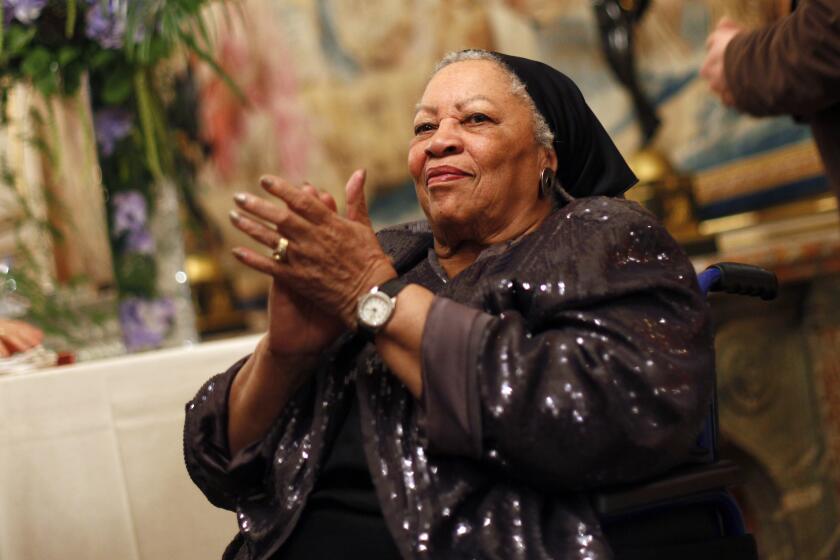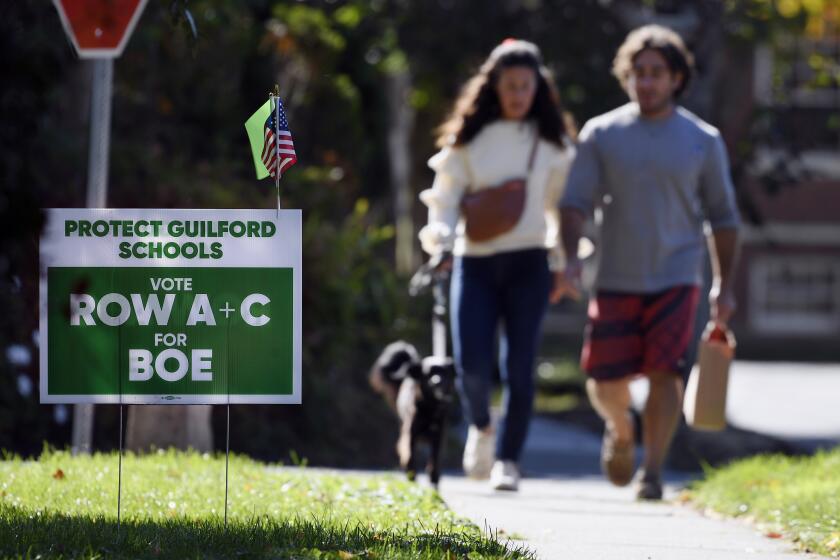A ‘war on books’? Conservatives push for audits of school libraries
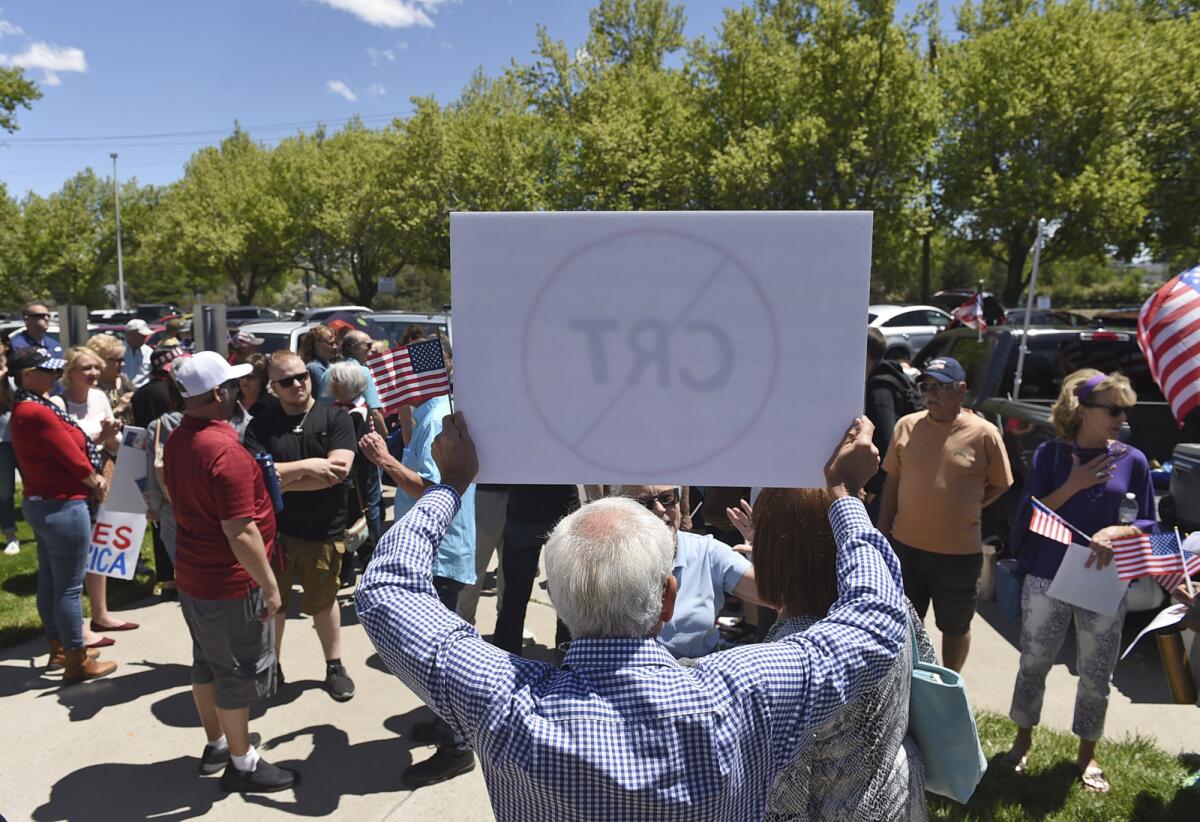
- Share via
HOUSTON — During the last year, Mary Ellen Cuzela — concerned about students being indoctrinated about sex and “critical race theory” — successfully petitioned her suburban Houston school district of about 83,000 to remove two books from their libraries: the novel “Lawn Boy” by Jonathan Evison and the graphic novel “Losing the Girl” by MariNaomi.
Cuzela, a mother of three who works for the district as a substitute teacher, said she was encouraged by Republican Texas lawmakers’ focus on critical race theory, an academic legal framework for examining systemic racism taught in some colleges that she considers “Marxist ideology” and “anti-American.” She has a list of more than a dozen more books she wants removed from schools along Houston’s rapidly growing and diversifying Energy Corridor, home to some of the world’s major oil and gas companies.
“I don’t want to ban books. I don’t want to be a book burner. My goodness, no,” said Cuzela, 49, whose children have attended public school for years in Katy. “I’m not into censoring. That is not what this is about. We filter students’ internet access. We have keywords, trigger words, that we know people shouldn’t have access to as a minor. So why isn’t that same process in the school libraries?”
One of the books, “Lawn Boy,” refers to oral sex between boys, and the other, “Losing the Girl,” features LGBTQ characters.
Liberal parents have also pushed to remove books from schools in recent years: Burbank schools last year removed the classics “To Kill a Mockingbird” and “Of Mice and Men” after parents complained their depictions of race and racism were harmful to students (they were among the top banned books nationwide last year).
But the latest uproar over school libraries comes as conservatives attempt to ride a wave of “white backlash” among supporters of former President Trump to victory in next year’s midterm election. The strategy appeared to work in the closely watched Virginia governor’s race Tuesday, where Republican newcomer Glenn Youngkin beat former Democratic Gov. Terry McAuliffe after promising to ban critical race theory in schools.
Cuzela has followed the Virginia debate, adding books banned there to her list. Nationwide, lawmakers have banned critical race theory — which has been used as a catchall phrase to refer to a variety of subjects some conservatives don’t want taught — from public schools in Arkansas, Arizona, Florida, Idaho, Iowa, New Hampshire, Oklahoma, South Carolina, Tennessee and Texas.
Virginia’s race for governor, the most hotly followed contest in the country, is a battle over culture. The GOP has focused on schools, Democrats on Trump.
Book debates are fueled by social media posts and YouTube video of parents complaining at school board meetings from politically transitioning suburbs like Katy, a viral “war on books,” according to Richard Price, political science professor at Weber State University in Ogden, Utah. Price, who identifies as nonbinary, is the author of the Adventures In Censorship blog, which includes entries about “Lawn Boy” and another book often challenged recently, “Gender Queer: A Memoir” by Maia Kobabe.
While school boards in Ramona and Paso Robles have banned so-called critical race theory, Price said book challenges are not as common in California as they are in red states, where viral posts spread faster as they’re picked up by right-wing bloggers and media.
“‘Lawn Boy’ is a book no one heard about until a mom showed up and ranted about it at one of the Texas districts, and video of her rant circulated on YouTube. ‘Gender Queer’ is circulating the same way,” Price said (video of the mother ranting about “Lawn Boy” in the Austin suburb of Leander has been viewed more than 19,000 times and spawned similar complaints in Virginia).
Price said challengers’ objections are often Black Lives Matter and LGBTQ issues, but “they dress it up as ideology.”
After Texas lawmakers banned critical race theory in public schools this year, battles grew particularly heated in the conservative suburbs surrounding the state’s largest, liberal cities. Parents and groups who have spent decades fighting at the state board of education over textbook content shifted their focus to school districts, prompting petitions, protests and testy exchanges at school board meetings.
In the Dallas suburb of Southlake, the school board voted to reprimand a fourth-grade teacher earlier this year for keeping an anti-racism book in her classroom after parents complained. Last month, leaked audio of an administrator in the district instructing teachers to present “opposing” views of books about the Holocaust sparked national outrage. In another Dallas suburb, a group of conservative activists, Respect Midlothian 1888, decried teachings they said support critical race theory and called for the district diversity officer’s removal.
In the Fort Worth suburb of Keller, school officials removed “Gender Queer: A Memoir” from a high school library “pending investigation” after parents complained it contained graphic images.
In the Houston suburbs, officials with the Spring Branch school district removed “The Breakaways,” by Cathy Johnson, a graphic novel featuring a transgender character, after parents petitioned and complained that it was sexually explicit and contained “political propaganda.”
On Monday, Gov. Greg Abbott sent a letter directing officials of the Texas Education Agency, state library and board of education to “develop statewide standards to ensure no child is exposed to pornography or other inappropriate content in a Texas public school.”
Last week, Abbott — running for reelection against two conservative primary challengers — sent a letter to the Texas Assn. of School Boards and several state agencies demanding they investigate “pornographic” books that parents had complained about at public schools, even though the agencies lack that authority.
“These parents are rightfully angry,” Abbott wrote. “… Your organization’s members have an obligation to determine the extent to which such materials exist or are used in our schools and to remove any such content.”
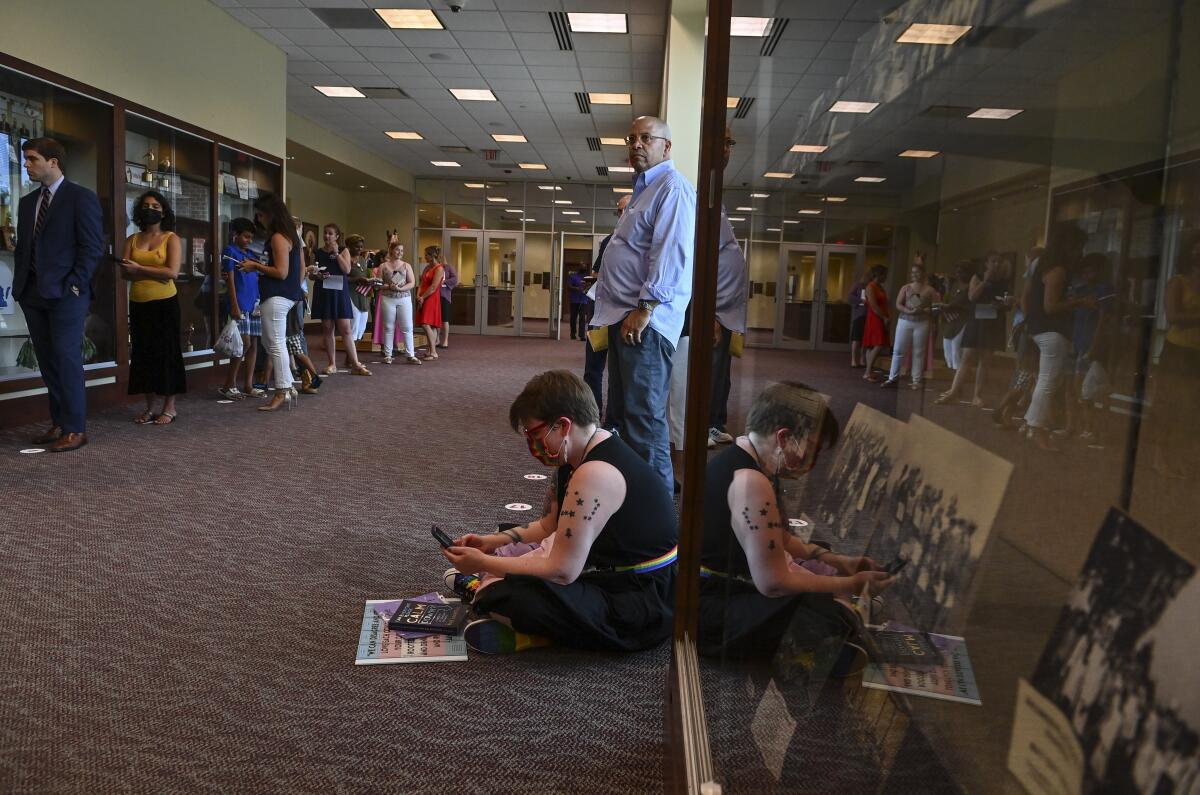
Abbott didn’t specify which books parents had complained about, and his spokeswoman didn’t respond to a request for comment.
The week before, state Rep. Jeff Cason from the Dallas suburbs called for Atty. Gen. Ken Paxton — a fellow Republican facing primary challenges in the upcoming election — to investigate “the legal ramifications to school districts” of approving books that may “violate the penal code in relation to pornography.”
“We as a state must protect minors from this type of criminal activity, and it should not be made available to children by the actual people that are tasked in educating them,” Cason wrote.
Republican Rep. Matt Krause of Fort Worth, among those running against Paxton, sent a letter in his capacity as chair of an investigative legislative committee to several of the state’s largest school districts requesting they review a 16-page list of 850 books that he claimed potentially failed to comply with the new ban on critical race theory. In the Oct. 25 letter, Krause noted that several districts had recently removed books in response to complaints from “students, parents and taxpayers” including Katy, Southlake, Spring Branch, Lake Travis and Leander.
In school board races around the country, activists are running against critical race theory.
In addition to the list, Krause asked districts to identify any of their books that were about “human sexuality, sexually transmitted diseases, or human immunodeficiency virus (HIV) or acquired immune deficiency syndrome (AIDS), sexually explicit images, graphic presentations of sexual behavior that is in violation of the law or contain material that might make students feel discomfort, guilt, anguish, or any other form of psychological distress because of their race or sex or convey that a student, by virtue of their race or sex, is inherently racist, sexist, or oppressive, whether consciously or unconsciously.”
Krause didn’t respond to requests for comment. But he told Dallas radio host Mark Davis that after lawmakers banned critical race theory, his inquiry “could be a big benefit for those school districts who are going through the inventory to say, ‘Hey, do we have something that could be in violation or do we not?’”
His list of questionable books included “Gender Queer,” “Lawn Boy,” “New Kid,” “The Breakaways” and “Out of Darkness,” by former Texas public school teacher Ashley Hope Pérez.
Pérez, now an assistant professor at Ohio State University, said that as a survivor of sexual abuse, it was important to her to make her main character a survivor as well, and that the graphic passages to which critics object were part of that. She has received threats after a mother’s rant about her book in Lake Travis went viral (Jimmy Kimmel cited it, leading Pérez to post a video response) and it’s been challenged in Missouri, Texas and Virginia.
“Republicans think they have found a winning issue in this, to the detriment of learners. And Democrats haven’t found a message to respond to that,” said Pérez, who is white and has two sons who are Mexican American, ages 11 and 6. “These challenges are rooted in a broader effort to undermine public education and the establishment of a more diverse and inclusive society. The message these parents are sending is, ‘I wish these people didn’t exist, and because I can’t get rid of the people, I want to get rid of the books.’ ”
Pérez and Price tweeted about books on Krause’s list Thursday with the hashtags #txlege and #FReadom.
“One of the reasons I defend access so heavily is because I am ridiculously happy that kids have access to these book today,” they said. “Whereas some want to claim it’s pornography, I see it as a lifeline.”
Price, who has been monitoring book challenges since 2018, said there’s anecdotal evidence that schools have become more willing to capitulate, removing “Gender Queer” from schools, sometimes without the required review.
“They’re trying to appease the groups challenging these books. Usually, that doesn’t work. Once you start removing books, they come back for more.”
Johnson, author of “The Breakaways,” fears “a ripple effect from the larger, more terrifying trend of targeting Texan transgender youth,” noting Texas state lawmakers just banned transgender girls from youth sports.
“Book banning is a way to drum up media ‘debate,’ distracting the public from important facts that are not up for debate: LGBTQQIA Texans of all ages deserve the same opportunities as all other Texans. I stand in solidarity with LGBTQQIA Texans,” Johnson said.
Krause gave districts until Nov. 12 to respond. He has yet to disclose which districts he sent the letter to, or the criteria he used to select the 850 books he asked them to scrutinize.
Cuzela, the Katy teacher, said she was encouraged to see Texas lawmakers backing her and other conservative parents. On Monday, she emailed her local school board and superintendent to ask how they plan to respond.
“I keep pressing them that we need to have a library audit,” Cuzela said. “I love that Krause is making it official, and hopefully this will put pressure on them.”
Cuzela has already challenged another book in Katy schools, “Me and Earl and the Dying Girl” by Jesse Andrews, and is preparing additional challenges.
“My plan of action is to continue down the list. I still have my working list, not quite the list Krause had,” she said.
Katy Independent School District was still reviewing Krause’s letter last week, according to spokeswoman Laura Davis.
Krause’s list and letter were condemned by the Texas House Democratic Caucus, Texas House LGBTQ Caucus, and Texas Legislative Black Caucus. State Rep. Chris Turner, chair of the Democratic Caucus, called it a “fishing expedition.” Rep. Nicole Collier, an attorney from Fort Worth who chairs the Legislature’s Black Caucus, called it “a witch hunt.”
Dallas Democrat Victoria Neave, vice chair of Krause’s legislative committee, dismissed the letter as “yet another attempt by Republicans to censor the voices of people of color.”
Neave said she spoke with Krause and requested a copy of the letter and a list of the districts he contacted. She said that he had yet to respond, and that she saw the letter as a dangerous campaign ploy.
“It’s this coordinated strategy by the Republicans to erase our history,” said Neave, who is Latina, noting that the majority of Texas students, and Texans, are minorities, while the state Legislature is overwhelmingly white and male.
“They’re trying to police what books they read. It’s an overreach into our classrooms. Our schools should be focusing on educating our kids, not on wasting taxpayer dollars on researching books for one person’s political gain.”
Ovidia Molina, president of the Texas State Teachers Assn., which has 40,000 members in 1,200 districts statewide, said the law banning critical race theory and Krause’s letter had a chilling effect on teachers.
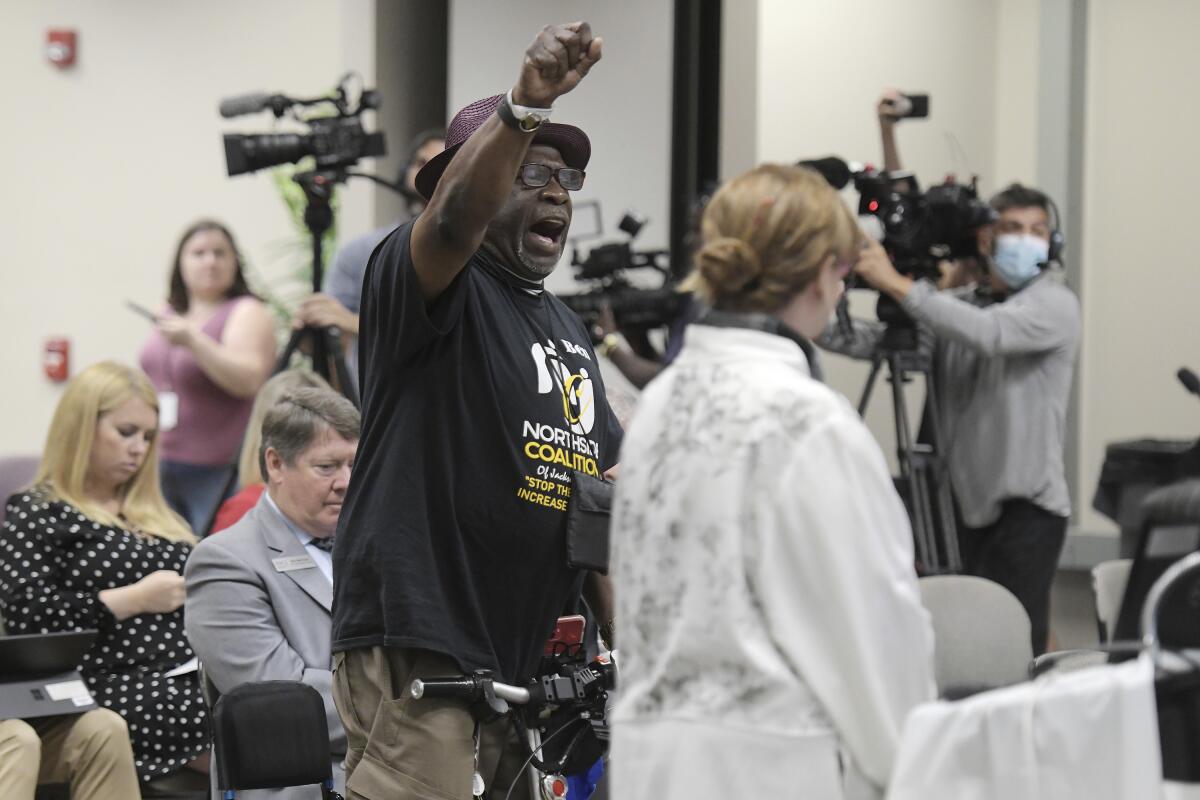
“They’re uncertain as to what they are allowed to do and not get in trouble,” she said. “We don’t know what will get you in trouble until you get in trouble and we have to defend you. That’s no way for educators to live.”
Molina said she was pleased to see some districts “stand up and not be bullied by our state,” but that as a Salvadoran American former English as a Second Language teacher, she worried about the impact on Latino students. She noted that many of the books on Krause’s list were both about and written by minorities.
“You’re not just attacking the content, but also people of color,” she said.
Molina said the battle over school library books might also drive Texas teachers to other states that pay better. Texas pays teachers an average $57,600, which is below the national average of $65,000, according to the National Education Assn. annual survey.
The state’s largest school districts confirmed they had received the letter, as well as suburbs such as Garland and Mesquite.
Houston, the largest district in the state and seventh-largest in the nation with nearly 200,000 students, received the letter, but officials had no comment about how they planned to respond, spokesman Luis Morales said.
Keller schools planned to treat Krause’s letter as they would any public information request, a spokesman said.
Some of the state’s other large districts — including Austin, Dallas and Fort Worth — refused to comply with Krause’s inquiry, spokesmen said. They said that their library catalogs were publicly searchable and that they already meet state curriculum standards for book selection. Some of the same districts defied the Texas governor’s attempts earlier this year to ban COVID -19 mask mandates.
“We follow all state-approved processes for selecting new textbooks for our students. We select from state-approved lists, organize a committee of experienced educators to review options, provide an input process for the public, and then make a final selection,” Fort Worth Supt. Kent Scribner said in a statement. “… We have a process for parents to request a review of any title found in their campus library that may present a concern.”
Katy schools have a similar complaint system that parent Bonnie Anderson used earlier this year after her 8-year-old twins brought home a flier about a school event featuring what she called critical race theory, a virtual event with Jerry Craft, author of “New Kid.”
Anderson, 43, organized opposition through text and Telegram groups, including Cuzela. After more than 400 people petitioned, the book was temporarily removed from school libraries, and the book event rescheduled.
“I don’t ban books — that’s not my thing,” Anderson said. “There’s just so much great literature out there, I just don’t understand why these books have to be there. When I send my kids to school, I want them learning reading, writing and math and not becoming indoctrinated, and it seems that’s so hard now.”
Anderson said she was encouraged by the state law banning critical race theory, but that it was up to parents to hold teachers and schools accountable.
“Teachers are still going to teach what they want and every once in a while they’ll get caught,” she said, but the law “helps hopefully prevent this type of teaching by teachers who want to bring division into the classroom.”
More to Read
Sign up for Essential California
The most important California stories and recommendations in your inbox every morning.
You may occasionally receive promotional content from the Los Angeles Times.

